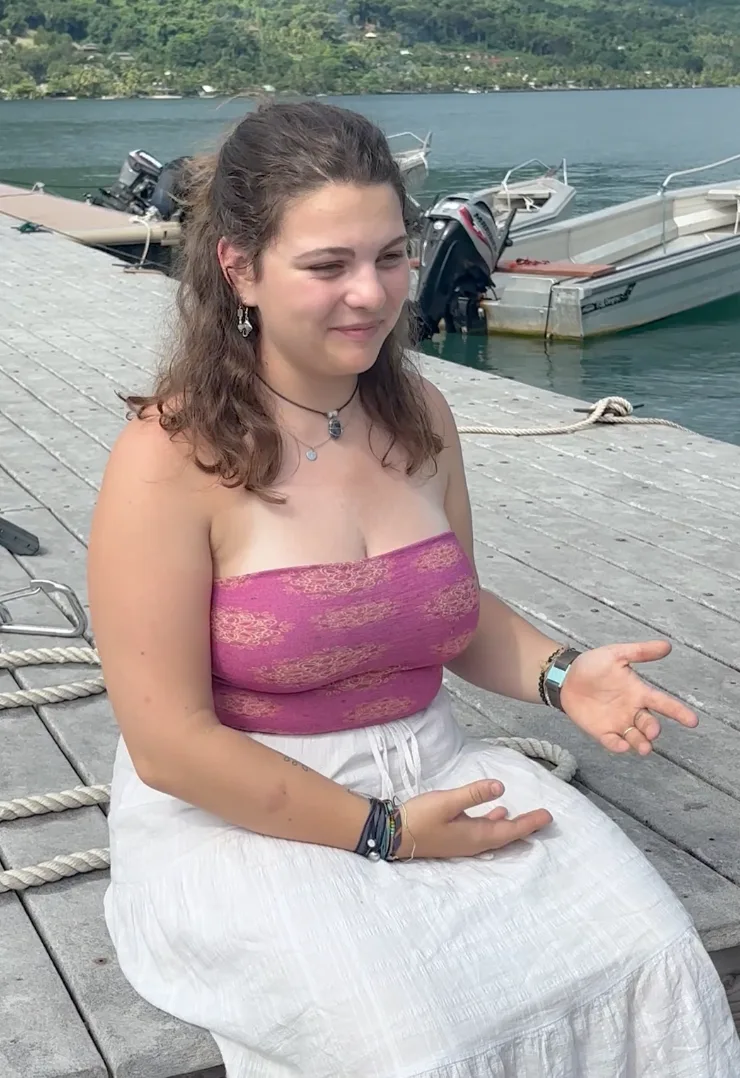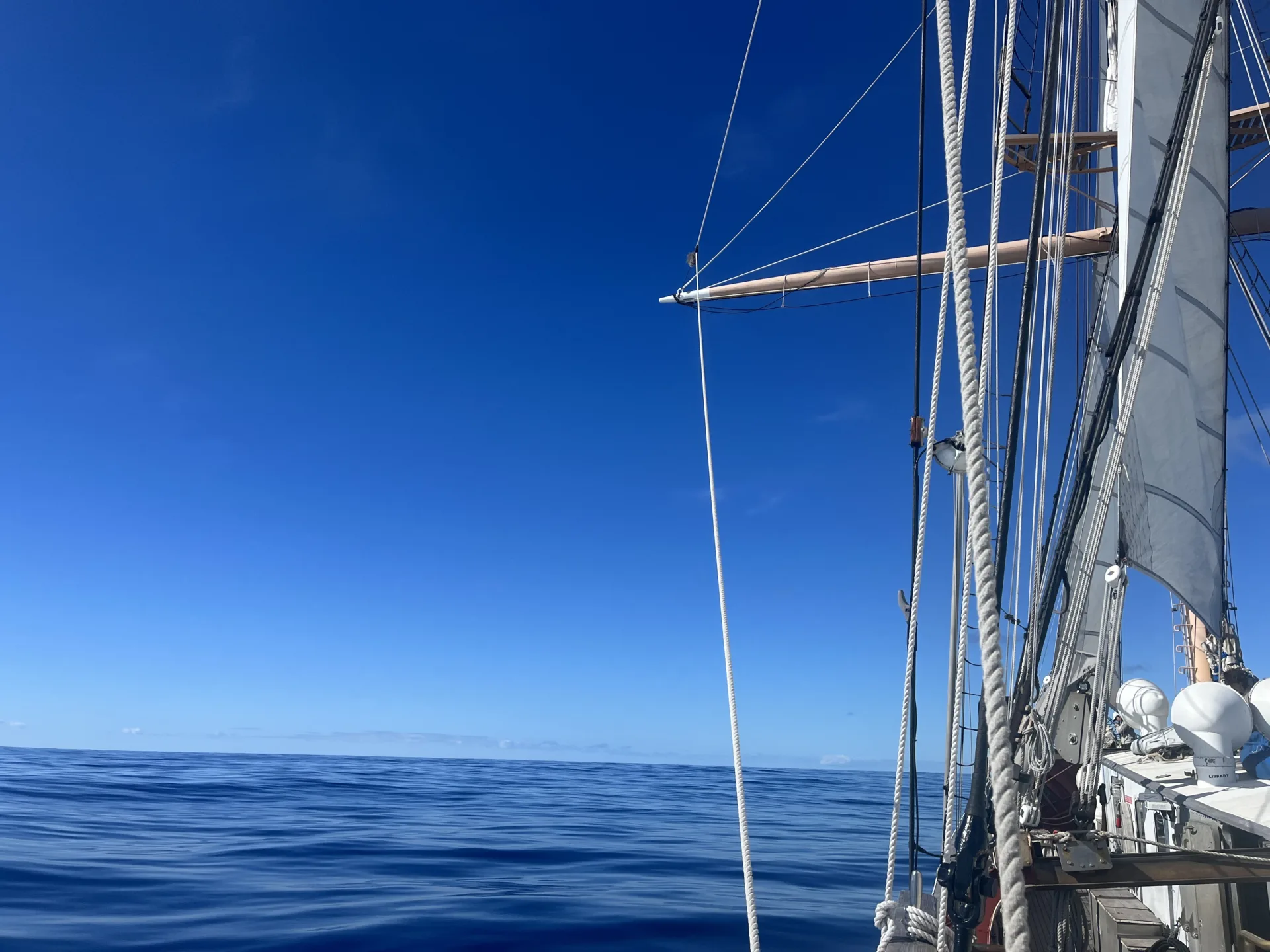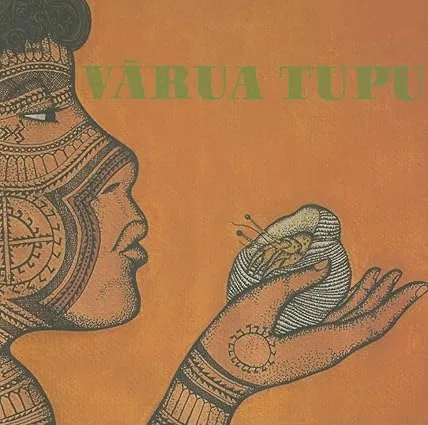Programs Blog
Georgia on Shifts in Perception

Date: May 26, 2025
Time: 1430
Location: Gump Marine Station, Mo’orea
Weather: 84˚ F, 10-15 kts easterly
This is an excerpt of an interview with Georgia Akins, Macalester College.
Could you tell us a sea story?
That’s difficult. I have a lot. I would say one of my best memories was probably Easter. That was one of the days we got some really calm water for the first time. Up until then, the first two weeks, it had been really rocky, choppy–not super, super enjoyable. Honestly, I was questioning my decision a little bit. I was like: Why did I want to do this? And then when I was on dawn watch on April 20th , I was watching the sunrise and the water was like glass. It was so flat. I remember finishing watch that day, having a big breakfast, going back to sleep and waking up for lunch and the water was still so, so flat. Later we got the wake-up, “Swim call in 5 minutes!”
I remember I was actually the first person off the bowsprit that day, jumping into the water. It was just so incredible, and I remember thinking this is something I would never have imagined doing. And then I was contemplating: I should go back to bed, I have evening watch tonight, I should get some more sleep. But I had all this energy, so I ended up staying up for the rest of my off time, just lying on the house top, reading my book, people starting getting some guitars out, playing some music. It was just so wholesome. Then sun started setting. It was so gorgeous. It just made me realize in that moment: I am supposed to be here. I am where I want to be, and I’m glad I made this decision. It was really gratifying.
Do you feel like your perception of the ocean has changed over the course of the semester?
Yes, definitely. Because I’ve never even lived near the coast. It was so interesting going from seeing the ocean only from a coastal perspective, the wind pretty consistently from the same direction, and then going out in the middle of the ocean and becoming so much more aware of all the different factors that affect your surroundings. It’s just—wow—it’s not just a coastal sea breeze. For me, being out on the open ocean really helped me put in perspective just how big it is. You could see nothing. It was just vast open blue. It was absolutely gorgeous. I don’t think I’d ever thought about the ocean in that context.
How about your perception of ocean management, has that changed?
Going aboard the Seamans, after all of our classes in Woods Hole, I had an understanding of what ocean management was like, but from a terrestrial perspective. Oh, this is a separate place that I don’t really have a stake in. I mean, there are environmental stakes, but no one lives there. You don’t really see how important it is, how much is changing, and how we can really approach that in an effective manner. It seems like it would be easy. You think it’s just a big pool of water. But being in the middle of the ocean I saw how much you need to pay attention to. It actually gave me some perspective on how important it is for us to make effective solutions for ocean management, especially beyond national jurisdictions.
Not as many people have access to those big open ocean spaces, and being able to share that opportunity is a big part of communicating the importance of them.
In our “Environmental Communication” class yesterday we read together the introduction to an anthology titled Vārua Tupu: New Writing from French Polynesia. What’s on your mind about this reading and our discussion.
This is the first, or at least one of the first books, that put together art, poetry, and literature from this part of French Polynesia for an English-speaking audience. The reading introduced us to the linguistic and cultural histories of this area. Something that stood out to me was how recent was the transition from Tahitian to French. This introduction was talking about the suppression of the native Tahitian language, how that has shaped the current culture and how that has influenced the recent revival of Tahitian culture. It made me think about how things like language can be a barrier, but also open up so many opportunities, especially when you do have some sort of translation and are able to share that with others.


Recent Posts from the Ships
- Ocean Classroom 2024-A collaborative high school program with Proctor Academy
- Collaborations and Long-term Commitments: SEA’s Caribbean Reef Program Sets a Course for Coastal Programs that Compliment Shipboard Experiences.
- Sea Education Association students prepare for life underway using state of the art nautical simulation from Wartsila Corporation.
- SEA Writer 2022, Magazines From the Summer SEA Quest Students
- Technology@SEA: Upgrades Allow Insight into Ocean Depths
Programs
- Gap Year
- Ocean Exploration
- High School
- Science at SEA
- SEA Expedition
- SEAScape
- Pre-College
- Proctor Ocean Classroom
- Protecting the Phoenix Islands
- SPICE
- Stanford@SEA
- Undergraduate
- Climate and Society
- Climate Change and Coastal Resilience
- Coral Reef Conservation
- Marine Biodiversity and Conservation
- MBL
- Ocean Exploration: Plastics
- Ocean Policy: Marine Protected Areas
- Oceans and Climate
- Pacific Reef Expedition
- The Global Ocean: Hawai'i
- The Global Ocean: New Zealand